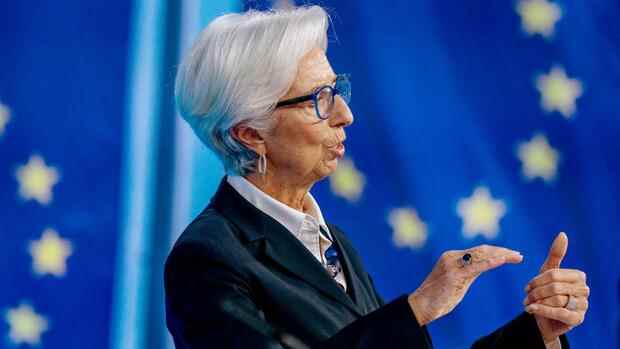The ECB will ensure that monetary policy is implemented smoothly.
(Photo: dpa)
Frankfurt For a long time, ECB President Christine Lagarde described the high inflation in the euro area as a temporary phenomenon. However, for some time she has changed her choice of words and avoids this description.
“It is unlikely that we will return to the same inflation dynamics that we experienced before the pandemic,” she said in her speech at the annual conference “The ECB and its watchers” in Frankfurt on Thursday. For this reason, the European Central Bank (ECB) decided to reduce its bond purchases faster than originally planned.
The question of whether the currently very high inflation in the euro area, which was 5.9 percent in February, is due to special effects caused by the pandemic or whether it will last longer is controversial among economists.
ECB President Lagarde sees both short-term and longer-term effects. In her speech, she pointed out that about two-thirds of the inflation was recently due to higher energy and food prices. Here it is noticeable that after the reopening of the economy, supply did not keep pace with demand.
Top jobs of the day
Find the best jobs now and
be notified by email.
In addition, the pandemic has caused a shift in demand from services to goods, which has also led to sharp price increases.
A classic example: Many people have canceled their gym memberships and instead bought exercise equipment for their own homes, which has led to supply shortages. From Lagarde’s point of view, there are certain parallels between the situation during the pandemic and the period immediately after the Second World War, when there were also severe shortages and price increases.
Inflation expectations are also rising
However, the ECB President also sees long-term effects. The level of employment in the euro area has increased. “Unemployment in the euro area is as low as it was in the 1970s,” stressed Lagarde. This could lead to wages, which have only been rising slowly up to now, rising more sharply.
Inflation expectations have also risen recently. Central banks like the ECB pay close attention to this because higher expectations can lead to inflation becoming more stable.
>>Read also: ECB surprisingly throttles bond purchases – a swing with many options
Lagarde also warned that the war in Ukraine could exacerbate inflation, especially in the short term. Russia is not only an important exporter of oil and gas, but also of wheat and other raw materials that are needed for fertilizers or catalysts, for example. Here the prices could rise further.
Lagarde also sees risks in the medium term. As a result of the war, the prices of goods such as petrol and food in particular will probably rise more sharply. These would be perceived particularly strongly by consumers because they constantly buy and compare them in everyday life. Lagarde recalled studies according to which such strongly perceived prices particularly influence inflation expectations.
She also sees the risk that the war will also increase deglobalization, i.e. the tendency for companies to rely more on local suppliers, which is also seen as a price driver. From their point of view, however, it is unclear whether this will drive prices up even more. On the other hand, growth will probably be lower due to the war, which would tend to dampen inflation.
More: First increase since 2018: US Federal Reserve initiates interest rate turnaround
